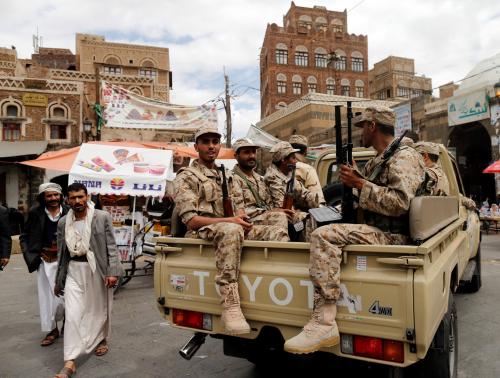Should Congress give President George W. Bush the authority he has requested to wage war against Iraq? Perhaps, but not now.
Too many questions remain unanswered, both about why a war would be fought and about its consequences for the region. Before voting for war, Congress has a solemn constitutional responsibility to ask these questions before it votes for war.
Bush wants sweeping authority from Congress to move against Baghdad. The legislation the White House sent up to Capitol Hill last week would authorize him “to use all means that he determines to be appropriate” not only to bring Iraq into compliance with United Nations Security Council resolutions, but also to “defend the national security interests of the United States against the threat posed by Iraq” and to “restore international peace and security in the region.”
The administration argues that Congress needs to act quickly to back its policy of confronting Iraq. Only by speaking clearly with one voice can the United States force Iraq to come clean about its weapons of mass destruction. As Bush said, “If you want to keep the peace, you’ve got to have the authorization to use force.”
Congress should support the president in his effort to disarm Iraq. But there are a number of reasons why it is still too early to authorize war.
Most important, Bush has not yet decided whether to go to war. He has called for changing the Iraqi regime, but deliberately left open how he intends to accomplish this. Congress should not decide the issue of war and peace before the president has. Its constitutional war power is a use-it-and-lose-it authority—once power is delegated it is difficult to reclaim. To authorize the president to use force now, before any of the circumstances for going to war are known, would be to issue the blank check that no lawmaker wants to write.
Presidents are the ones to fill in blank checks. The Gulf of Tonkin resolution is a powerful reminder that they do not always do so wisely. Four months from now, members could find they have authorized a war they do not support. Even if Iraq complies with each and every UN resolution, the White House’s proposed language would empower the president to invade Iraq solely because he decides Baghdad still constitutes a threat.
Equally troubling, the administration’s proposed authorization to use force is boundless. Even if we avoid war now, the resolution could be used by future presidents in entirely different circumstances. Such a fear is not far-fetched. Only last month, White House lawyers argued that when Congress voted in 1991 to support President George H.W. Bush’s decision to liberate Kuwait they were also authorizing his son 11 years later to overthrow Saddam Hussein.
Finally, George W. Bush’s proposal is so broad in scope that it would authorize him to wage war not only against Iraq, but anywhere else in the region as well. That is the consequence, whether intended or not, of asking for authority to use force to “restore international peace and security in the entire region.”
Postponing the decision on war until we face that question squarely—and can write a resolution tailored to the specific circumstances—does not mean that Congress should do nothing in the interim. It needs to hold in-depth hearings to examine the many complicated issues raised by a possible war against Iraq.
How would such a war be conducted? How would we respond to Iraq’s use of chemical or biological weapons? What are our responsibilities for post-war stability once Saddam Hussein is ousted?
As it debates these issues, Congress can send a clear and unmistakable signal of support for the president by passing a resolution endorsing the goals of his Sept. 12 speech to the UN. That resolution should insist that Iraq agree to permit free and unfettered weapons inspections.
Baghdad might still resist concerted international pressure to accept effective inspections—in which case war would become necessary. Only then, when the American people know what they are being asked to support, should Congress vote for war.
It may be tempting politically to give the president what he asks for now, but doing so could come at a high price. As members of Congress learned during Vietnam, the wars they authorize in haste they may come to regret at their leisure.



Commentary
Op-edIt’s Too Soon to Give Bush War Power in Iraq
September 25, 2002